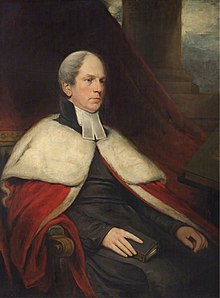Preaching to a polite and commercial people: A Hackney Phalanx sermon on the love of money
Now this might seem an odd introduction to the next extract in the series from an 1814 collection of sermons by Christopher Wordsworth (senior, d.1846), associated with the Hackney Phalanx. The connection is, however, two-fold. Firstly, the cultural and social context in which these sermons were delivered - particularly to educated Anglican laity - was one aptly summarised by the phrase 'a polite and commercial people'. Secondly, Lord Liverpool's ecclesiastical policy was profoundly influenced by his relationship with the Hackney Phalanx: as Hay notes, Liverpool strongly identified with the principles and concerns of the Hackney Phalanx.
This background makes the following extract interesting. Wordsworth roundly challenges commercial aspirations, ambitions, and desires which are not grounded in, and reformed by, a Christian moral vision. He does so, not as a lowly cleric far from the centres of influence, but as a former domestic chaplain of Archbishop of Canterbury Charles Manners-Sutton, a former chaplain to the House of Commons, who dedicated this collection of sermons to the Archbishop's son (to whom he had been tutor), then Judge Advocate General in the administration of Lord Liverpool.
The extract, in other words, is an example of how the preaching of the Old High tradition of the Hackney Phalanx was - contrary to later, woefully inaccurate stereotypes - incapable of or unwilling to meaningfully challenging norms and aspirations of Georgian society:
But Demas, his choice and desire was this world and like all those who seek their portions, and set up their abode here, he found, it cannot be doubted, that very world, vanity, and bitterness, and vexation of spirit; short-lived, empty, and unprofitable.
For what is it? Truly it cannot satisfy. For, "What is a man profited, if he shall gain the whole world, and lose his own soul ?" Is it everlasting like Heaven? "The fashion of this world passeth away." What is your life? "It is even a vapour that appeareth for a little time, and then vanisheth away." The rich man when he dieth, shall he carry any thing away with him? Shall his glory descend after him? "We brought nothing into this world, and it is certain we can carry nothing out."
It was such as Demas whom St. Paul spake of, when he continued, "But they that will, be rich, fall into temptation and a snare, and into many foolish and hurtful lusts, which drown men in destruction and perdition: For the love of money is the root of all evil: which while some coveted after, they have erred from the faith, and pierced themselves through with many sorrows." Yea, the time must come, when they shall find, to their bitter woe, that such a friendship with the world has been enmity with God: that is, that whosoever will be a friend of the wicked, carnal, unbelieving, and apostate world, is the enemy of God.




Comments
Post a Comment